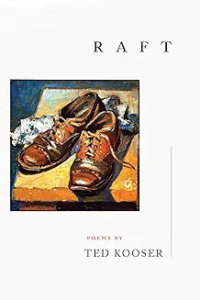Raft: Poems by Ted Kooser 2024
I’ve always loved the poetry of Ted Kooser, a Nebraskan who has written about the Great Plains, always been much beloved by him. His poetry is plain, simple, vivid, and remarkably calming even when he’s writing about aging, death, and loss.
Kooser at 86 could be forgiven for sitting on his laurels—a Pulitzer Prize in 2005 and U.S. Poet Laureate for two terms—but he continues to write and “Raft” is his 27th volume of poems. He is to Nebraska and the Great Plains what Robinson Jeffers is to Big Sur, Jim Harrison to the Upper Peninsula of Michigan, and Emily Dickinson to her world of one bedroom. Through all these years he has continued to write about the people, the animals, the landscape, and the history of his lifetime home.
Among the six of his poetry volumes that I’ve read, the two that stand out are his “Winter Morning Walks: One Hundred Postcards to Jim Harrison” written by Kooser when he was in the midst of chemotherapy and reflecting the quotidian beauty of early morning, rural Nebraska. I also loved his ” Braided Creek: A Conversation in poetry with Jim Harrison and Ted Kooser”. In both, two of my favorite poets turned to their craft to deal with difficult life issues and phases. Harrison died in 2016, a man full of life, wine, food, travel, hunting and fishing, and the outdoors. His friendship with Kooser, a quiet, stay at home, modest man, looked strange on the surface but ran deep for these two poets.
“Raft” is a bit uneven. The two sections that deal with people are superb. The one that deals with animals, less so. But, there were wonderful words, phrases, and stanzas to make the reading a treat. Kooser’s metaphors and similes are often subtle and sneak up on you like in his poem “Rake” in which he compared an elderly man leaning on his rake in the middle of a circle of leaves to a second hand with his two hands perched on the shaft of the rake holding back time. Or when describing a funeral in “A Light Rain” he referred to the pallbearers as “borne by men of six ages”, implying sons, grandsons, and old friends of the deceased. His comparison of cars merging into the highway to a zipper’s teeth engaging or describing his difficulty in identifying with the person collecting shopping carts by writing, “me, trying to fit into your broken-down/, badly run over shoes.”
Themes of aging, loss, death, memories, family, the rural landscape, and over everything the importance of the unremarkable individual living a simple life are always there. One poetry critic described his work this way: “(Kooser is) a “popular poet”—not one who sells millions of books, but popular in that unlike most of his peers he writes naturally for a nonliterary public. His style is accomplished but extremely simple—his diction drawn from common speech, his syntax conversational. His subjects are chosen from the everyday world of the Great Plains, and his sensibility, though more subtle and articulate, is that of the average Midwesterner. Kooser never makes an allusion that an intelligent but unbookish reader will not immediately grasp. There is to my knowledge no poet of equal stature who writes so convincingly in a manner the average American can understand and appreciate.”
Here’s a simple poem that I loved for its subtlety, its nostalgia without sentimentality, and its calm and steady look at aging and death. It’s entitled “Bird”:
This happened many years ago on a Saturday morning/before a Memorial Day. I had driven my mother out to/the little Bethel Cemetery at Garber, on the high bluffs/back a few miles from the river, where a handful of people/were on their knees brushing clippings away from the/names on the markers, setting out tin cans of irises and/peonies or planting geraniums, and a big woman in blue/stiffly lifted herself and turned to us, and Mother also in blue, went to her; and the two of them, schoolmates as/children seventy years before, reached out and took each/other’s elbows, and they looked into each other’s eyes,/and the woman, whose voice faltered an instant, softly/ said “Vera,” and my mother, whose voice caught too, said/ “Bird.”
I had read that prose poem with pleasure earlier today, but typing it out brought tears to my eyes—it’s perfect. If you don’t know Kooser, make his acquaintance. You’ll find beauty and comfort.



